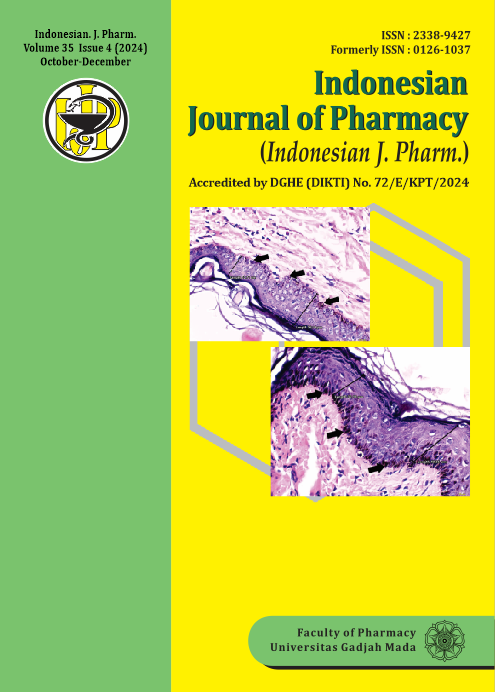In Vitro Drug Release Study of Bisacodyl Enteric-Coated Tablet in Various Artificial Dissolution Media
Abstract
This study aims to investigate the effect of dissolution media on the release of bisacodyl from an enteric-coated tablet. Genuine phosphate buffer pH 7.4 (phosphate buffer), rat cecal-containing phosphate buffer pH 7.4 (rat cecal), lactase-containing phosphate buffer pH 7.4 (lactase), probiotics-containing phosphate buffer pH 7.4 (probiotics), and probiotics & lactase-containing phosphate buffer pH 7.4 (probiotics-lactase) were used as the colon simulation media. The study was carried out in a modified type I dissolution test apparatus for 12 hours: 2 hours in HCl pH 0.1 M, 3 hours in phosphate buffer pH 6.8, and 7 hours on colon simulation media, sequentially. The sample aliquots were analyzed using a UV-Vis spectrophotometer. At the end of the dissolution period, the bisacodyl released from tablets in phosphate buffer, rat cecal, lactase, probiotics, and probiotics-lactase were, respectively, 42.095%; 85.835%; 70.594%; 92.832%; and 110.63%. The dissolution media, which contains probiotics and lactase, facilitated the highest bisacodyl release, followed by probiotics, rat cecal, lactase, and phosphate buffer. The drug-release profile among various dissolution media showed significant differences, with p-values < 0.05. It can be concluded that pH, microbial activity, and enzyme content significantly influence the release profile of bisacodyl from enteric-coated tablets.
References
Čoklo, M., Maslov, D. R., & Kraljević Pavelić, S. (2020). Modulation of gut microbiota in healthy rats after exposure to nutritional supplements. Gut Microbes, 12(1), 1779002. https://doi.org/10.1080/19490976.2020.1779002.
Dugad, A., Nalawade, P., Thakhre, R., Kakade, S. (2018). Colon targeted drug delivery system – A Review. Current Pharma Research, 9(1), 2604-2635.
Farag, Y., & Leopold, C. S. (2009). Physicochemical properties of various shellac types. Dissolution Technol, 16(2), 33-39. https://doi.org/10.14227/DT160209P33.
García, M. A., Varum, F., Al-Gousous, J., Hofmann, M., Page, S., & Langguth, P. (2022). In vitro Methodologies for Evaluating Colon-Targeted Pharmaceutical Products and Industry Perspectives for Their Applications. Pharmaceutics, 14(2), 291. https://doi.org/10.3390/pharmaceutics14020291.
Hsu, C. A., Yu, R. C., & Chou, C. C. (2005). Production of β-galactosidase by Bifidobacteria as influenced by various culture conditions. International Journal of Food Microbiology, 104(2), 197-206. https://doi.org/10.1016/j.ijfoodmicro.2005.02.010.
Iswandana, R., Putri, K. S. S., Dwiputra, R., Yanuari, T., Sari, S. P., & Djajadisastra, J. (2017a). Formulation of chitosan tripolyphosphate-tetrandrine beads using ionic gelation method: in vitro and in vivo evaluation. International Journal of Applied Pharmaceutics, 109-115. http://dx.doi.org/10.22159/ijap.2017v9i5.20842.
Iswandana, R., Putri, K. S. S., Sandiata, C. E., Sisilia, T, Sari, S. P., & Djajadisastra, J. (2017b). Formulation of tetrandrine beads using ionic gelation method CA-pectinate coated PH-sensitive polymers as colon-targeted dosage form. Asian J Pharm Clin Res, 10(10), 90-5. http://dx.doi.org/10.22159/ajpcr.2017.v10i10.19994.
Iswandana, R., Putri, K. S. S., Wulandari, F. R., Najuda, G., Sari, S. P., & Djajadisastra, J. (2018). Preparation of calcium alginate-tetrandrine beads using ionic gelation method as colon-targeted dosage form. Journal of Applied Pharmaceutical Science, 8(5), 068-074. https://doi.org/10.7324/JAPS.2018.8509.
Kementerian Kesehatan RI. (2020). Farmakope Indonesia Edisi VI. Jakarta: Direktorat Jenderal Kefarmasian dan Alat Kesehatan Republik Indonesia.
Kotla, N. G., Gulati, M., Singh, S. K., & Shivapooja, A. (2014). Facts, fallacies and future of dissolution testing of polysaccharide based colon-specific drug delivery. Journal of Controlled Release, 178, 55-62. https://doi.org/10.1016/j.jconrel.2014.01.010.
Philip, A. K., & Philip, B. (2010). Colon targeted drug delivery systems: a review on primary and novel approaches. Oman medical journal, 25(2), 79–87. https://doi.org/10.5001%2Fomj.2010.24.
Singh, A., Mandal, U. K., & Narang, R. K. (2021). Development and characterization of enteric coated pectin pellets containing mesalamine and Saccharomyces boulardii for specific inflamed colon: In vitro and in vivo evaluation. Journal of Drug Delivery Science and Technology, 62, 102393. https://doi.org/10.1016/j.jddst.2021.102393.
Singh, S. K., Yadav, A. K., Prudhviraj, G., Gulati, M., Kaur, P., & Vaidya, Y. (2015). A novel dissolution method for evaluation of polysaccharide based colon specific delivery systems: A suitable alternative to animal sacrifice. European Journal of Pharmaceutics and Biopharmaceutics, 73, 72–80. https://doi.org/10.1016/j.ejps.2015.03.012.
Vacca, M., Celano, G., Calabrese, F. M., Portincasa, P., Gobbetti, M., & De Angelis, M. (2020). The controversial role of human gut lachnospiraceae. Microorganisms, 8(4), 573. https://doi.org/10.3390/microorganisms8040573.
Zduńczyk, Z., Juśkiewicz, J., Wróblewska, M., & Król, B. (2004). Physiological effects of lactulose and inulin in the caecum of rats. Archives of Animal Nutrition, 58(1), 89-98. https://doi.org/10.1080/00039420310001656703.








